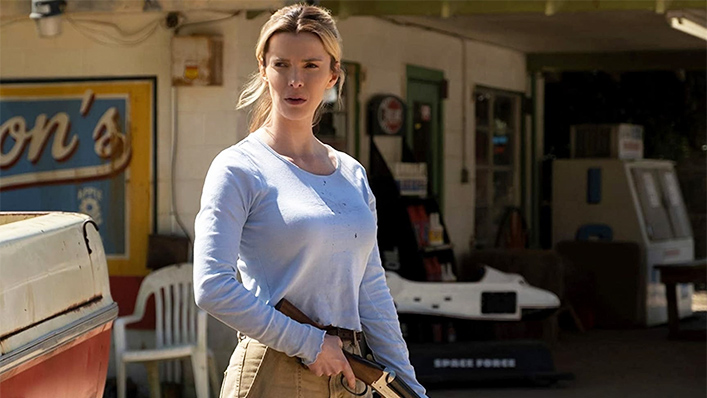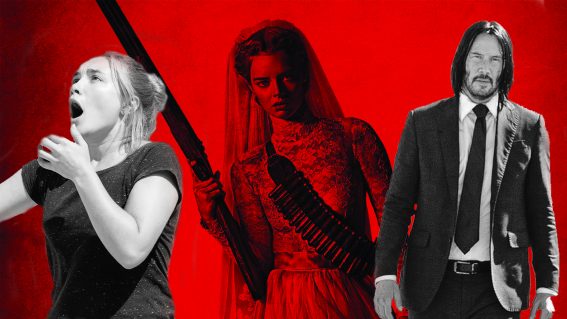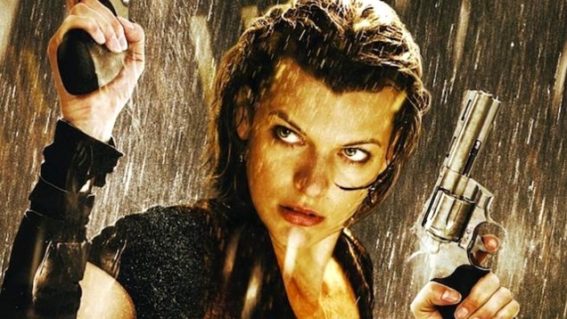The Hunt mixes wild action with a Truman Show-esque premise

The violent action-thriller The Hunt has been highly controversial in America, drawing criticism from the likes of Donald Trump. Now on digital release in Australia, this film is a wild ride, writes critic Luke Buckmaster.
The hero of The Hunt confronts the same challenge that beleaguered Neo and Truman Burbank: to peel back layers of a simulation and face dark forces in a root reality. It doesn’t take long for the tenacious Crystal (Betty Gilpin) to cotton on to the fact that something terrible is happening in the world around her—other than the rather, shall we say, bothersome recurrence of people popping up everywhere sharing a strong desire to kill her. Some folk aren’t who they say they are; others are as easy to understand as a slap in the face.
Director Craig Zobel’s Blumhouse-produced satirical horror has attracted considerable controversy in America—partly due to its channelling of the Hilary Clinton-coined insult “deplorables.” That slur is spoken by another Hilary—last name Swank—who plays the key villain Athena. Her sneering character reflects a contemporary revenge-cynicism, whereby what was once a feeling of empathy towards the less fortunate and less educated has mutated into outright resentment of the bumpkin experience; a base anger at ordinary people for doing stupid stuff like voting for Trump and consuming fake news.
The film reads on paper like a revamp of the 1982 Ozploitation pic Turkey Shoot, with its tournament-of-death premise involving the hunting of human beings for pleasure by rich elites. But Damon Lindelof and Nick Cuse’s screenplay riffs on ideas about reality and pantomime not dissimilar to David Fincher’s thriller The Game—where the “truth” about the world is obscured by people playing intellectual or sadistic pranks, and sometimes both. Crystal’s challenge involves ascertaining who is “genuine” and who is putting on a show. At times her life depends on it.
Zobel throws subverting audience expectations into the mix, turning previously for granted information into fake-outs and reversals. The Hunt begins, for instance, clearly implying that Emma Roberts—who is a known face, as the star of Scream Queens—will play the lead role. Her character is one of a bunch of strangers who wake up, mentally and geographically displaced, with gags in their mouths, and discover themselves in a grassy area with a large wooden crate in the middle of it, from which a tonne of high-powered weapons are removed.
We’ve found our protagonist, right? Wrong. Roberts’ character barely makes it through a few minutes of screen time being abruptly killed off. The baton passes to a young man next to her, who makes it through even less. The baton switching and dropping (a nice way of saying: sudden death) happens multiple times. So who the hell is leading this thing?
The switching of (supposed) protagonist and rearranging of expectations creates a destabilizing effect, before Lindelof and Cuse have even introduced the idea that certain characters might not be who they are presenting themselves as. At one point—and I’m being deliberately coy with details—one person shares with Crystal his suspicion that a handful of cowering, panicked people they encounter on a train are faking it. He reckons they’re “crisis actors” from Central Casting. Lindelof was a co-creator of Lost, by the way—a connection that helps explain the kind of trippy game-playing going on.
The Hunt is less effective (and in no way subtle) as a class commentary. You get the basic pole markers: it’s high society versus hoi polloi. The privilege of the former manifests as a kind of vain, seething attitude towards the rubes and redneckery of the latter, snarky cant prevailing because nobody can wrangle a subtext that goes meaningfully beyond ‘rich intolerant elites screw people for shits and giggles’. So the film becomes another revenge B movie. Crystal makes like The Bride and seeks to kill the Bill in question—Swank’s snarky and smug villain.
The pace is strong, at times cracking, even when the script’s sledgehammer sarcasm takes over and the ideas lose steam. Chocked full of mean hooey, and spitting out her lines with a cartoon temper, Betty Gilpin is pretty good in the lead role, but the question of what games the film is playing—shifting realities and relegating performances inside performances—is much more interesting than anything the humans are up to. The Hunt is best when it’s pitched as Turkey Shoot meets The Truman Show. When it’s not it can feel like weird, impenetrable agitprop.

















